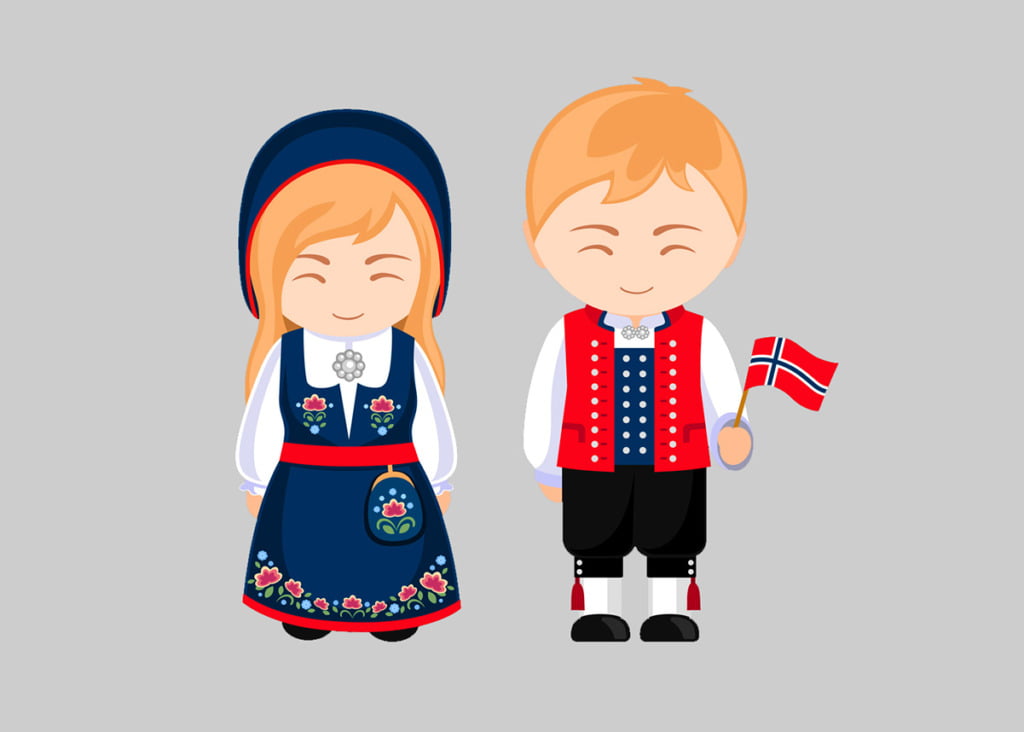If you've lived in Norway for several years, it might be time to consider strengthening your ties to the country. Learn everything you need to know about how you qualify to become a Norwegian citizen.
Most people gain their Norwegian citizenship at birth. However, it is also possible for people from other countries to become citizens of Norway later in their life. However, it is not an easy process.

Generally speaking, you will need to have had legal residency in Norway for at least seven years to be able to apply. You'll also need to be at least partially fluent in the Norwegian language.
But as with all things related to immigration, it is highly dependent on your personal circumstances. There were also some significant changes to the process and requirements during 2021 and 2022, of which many people were unaware.
Read on for more information and the latest requirements that apply as of January 2024.
Why become a citizen of Norway?
First things first, do you need to take citizenship? Many foreigners have been living in Norway for most of their adult lives and have not taken citizenship.
If you have permanent residence here, the day-to-day differences are marginal. So, why become a Norwegian citizen?
Citizens of Norway can vote in national elections, and receive a Norwegian passport. The latter could be a good enough reason to apply depending on the “quality” of your original passport.
 Hiking near Sæbø, Hjørundfjord (Photo: Mattias Fredriksson / www.fjordnorway.com)
Hiking near Sæbø, Hjørundfjord (Photo: Mattias Fredriksson / www.fjordnorway.com)What do I mean by that? Well, citizens of many countries face a lengthy visa process to travel to many countries. According to the Henley visa restrictions index, Norway's passport is one of the best in the world for freedom of movement.
Norwegian citizens enjoy visa-free or straightforward visa-on-arrival access to 173 countries and territories. We think that's something worth having! So, let's take a look at how to do just that.
Double citizenship in Norway
Up until recently, dual citizenship was not allowed. This meant that most applicants would have to renounce their previous citizenship in order to become a Norwegian citizen.
There were some exceptions to this rule, but it stopped many people who qualified from going ahead with the process. Norway was one of the few countries in Europe to have this restriction. Politicians had long debated removing this restriction.
In December 2018, the plans were finally approved with only minor opposition in Parliament. Opposition centred around issues such as whether people would have divided loyalties in wartime.
From January 2020, new citizens of Norway have no longer needed to give up their previous citizenship. Of course, if your original country does not allow more than one citizenship, you will still lose this citizenship when you become a Norwegian citizen.

This law change led to a big increase in applications and record numbers of new citizens.
How the process works
How do you become a Norwegian citizen? There is an online application process, but the requirements differ for different groups of people.
Some of the factors include the type of residence permit you have, how long you have been in Norway, whether you have family here, and if you have previously been a Norwegian citizen.
The rules typically fall into two broad categories:
- The length of time you've lived in Norway
- Your level of documented fluency in Norwegian
Now let's look into more detail at each of these points.
Residency period
Generally speaking, you must have lived in Norway for a total of eight of the past eleven years. This period was recently extended by a change in the Citizenship Act made by the Norwegian government, and applies from January 2022. It was previously seven of the past ten years.
In addition, you must have held valid residence permits (such as a work permit) that cover that period of time. The rules for residency depend, among other things, on whether you are a citizen of an EU/EEA country or not.

If you have ‘sufficient income', the residency requirement is reduced to six of the last ten years. At the time of writing, sufficient income is defined as an annual figure of NOK 329,352.
If you are married to, or are the registered partner or cohabitant of a Norwegian citizen, the time you have lived in Norway, you must have lived in Norway for a total of at least five years during the past ten years. In these cases, your combined residence period and marriage period must be at least seven years.
Typically, time spent away from Norway for more than two consecutive months in a calendar year extends the amount of time required for residency by the same amount.
So if you lived overseas for a year in the middle of your residency period, the time required extends to eight years. You must also intend to continue to live in Norway once you have been awarded citizenship.
Proving your language ability
Fluency in Norwegian is a non-negotiable when applying for citizenship. However, in October 2022, the rules were overhauled significantly. The focus now is on fluency in spoken Norwegian.
Previously, applicants had to have completed 250-300 hours of approved tuition in the Norwegian language and be able to document language skills.
This was done by passing the Norskprøve written and oral tests (levels 2 or 3), the Bergenstest, or another oral and written Norwegian test. The minimum level you needed to have attained was A2 or B1, depending on your current country of citizenship.
However, now what is required is a successful B1 grade in oral Norwegian. There is no longer a requirement for other language exams or a specific number of tuition hours.

There are a couple of exceptions to this rule whereby only A2 is required. These include people over the age of 55 who came to Norway as a refugee or receive disabled benefits.
Applicants for Norwegian citizenship must also pass an exam about Norwegian society, laws and history. There are two tests available: one is the social studies and the other is the citizenship test.
Nordic citizens
The biggest exception for citizenship rules is for nationals of the other Nordic countries.
The Norwegian Nationality Act of 1950 allows any Nordic citizen who has been legally living in Norway for at least two years and can understand Norwegian to become a citizen upon application.
There are reciprocal rules for Norwegian citizens who are living in other Nordic countries and wish to become a citizen there.
Citizenship through family ties
As with almost every country in the world, citizenship by birth is not applicable in Norway, unless the child has a Norwegian parent.
This means children of a foreign-born couple do not automatically become Norwegian citizens. However, if you were born in Norway to foreign parents, or moved here as a child, there is a shorter residence period requirement for the citizenship application.
There is also no provision for people with Norwegian heritage to become citizens by heritage. This means that someone identifying as “Norwegian American” is not entitled to Norwegian citizenship because they had a Norwegian grandparent.
Individuals in such cases have to meet the criteria for citizenship listed above, including the length of time with permanent residence in Norway and documented fluency in the Norwegian language.
Citizenship by heritage is very rare and is only really possible in Ireland and Italy. A handful of other countries offer something similar in very specific circumstances, but Norway is not one of those.
One big exception is if your parents were Norwegian when you were born. If so, check these pages to see if you qualify to become a Norwegian citizen.
 Norwegian Immigration Office
Norwegian Immigration OfficeFamily immigration permits are available, which mean that someone can move to Norway if their spouse or other immediate family member lives in Norway, in most circumstances. But this is a residence permit, and not the same thing as citizenship.
How to apply for citizenship
If you hold a valid residence permit in Norway and you live here on a permanent basis, you can apply for Norwegian citizenship. Your residence permit must be valid both when you apply and while your application is being processed.
It's very important to understand that applying for Norwegian citizenship does not mean that you have a valid permit to stay in the country. If you are here on a work permit and apply for citizenship, you must still apply to renew your work permit.
The actual process of starting an application is handled online, although you will have to hand over documents in person. To begin your application, complete the application form on the UDI website. You will be given an appointment to present your papers in person.
There is an application fee, which as of January 2024 is NOK 6,500 for an adult. This must be paid by debit or credit card during the initial application process. Those under the age of 18 do not pay.
Items you will need depend on your personal circumstances but will include the following:
- Birth certificate
- Certificate of marriage / partnership
- A full list of entries and departures to Norway, including a copy of all the pages in current and previous passports
- Tax returns covering the qualification period
- A police certificate proving good conduct
- Proof of language competency (exam results)
After becoming a Norwegian citizen, you will be invited to participate in a voluntary citizenship ceremony.
Questions?
I am just a writer, and have collected various bits of information here to help you understand the process.
Despite the number of people commenting below, please note that I do not work in immigration and cannot help or advise on individual cases.
The information above is a summary of what is available on the UDI website. Questions should be directed there. Thanks!
The post How to Get Norwegian Citizenship (Updated for 2024) appeared first on Life in Norway.

.png) 4 months ago
4 months ago
















 English (US) ·
English (US) ·